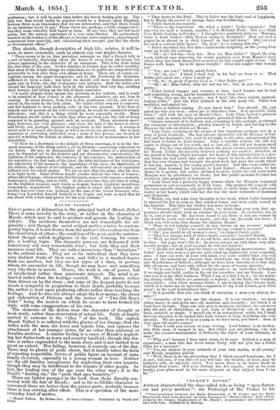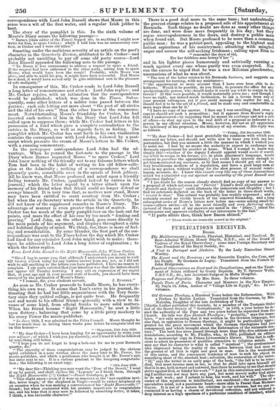CHOKER'S MOORE. * ASCHIM characterized the class called wits as being
"open flatter- ers and privy mockers ": the Postscript of Mr. Croker to his • Correspondence between the Right Honourable J. W. Croker and the Right Honourable Lord John Russell. on some Passages of" Moore's Diary," with a Post- script by Mr. Croker, Explanatory of Mr. Moore's Acquaintance and Correspond- ence with him. Published by Murray.
correspondence with Lord John Russell shows that Moore in this sense was a wit of the first water, and a regular Irish jobber to The story of the pamphlet is this. In the sixth volume of Moore's Diary occurs the following passage-
" Barnes (then editor of the Times) begged me, in anything I might now write for him, to spare Croker ; which I told him was an unnecessary cau- tion, as Croker and I were old allies."
Smarting under the malicious severity of an article on the poet's character in the Quarterly Review, attributed to Mr. Croker—and probably not unwilling to pay of some old party scores—Lord John Russell appended the following note to the passage. "To Moore it was unnecessary to address a request to spare a friend. If the request had been addressed to the other party, asking him to spare Moore, what would have been the result? Probably, while Moore was alive' and able to wield his pen, it might have been successful. Had Moore
been dead, it would have served only to give additional zest to the pleasure of safe malignity."
In consequence of this, Mr. Croker sends to Lord John Russell a long letter of remonstrance and attack : Lord John replies : and Mr. Croker rejoins, with an intimation that the correspondence would be published ; which was done in the Times. Subse- quently, some other letters of a milder tone passed between the parties; each side letting out more about "the poet of all circles and the idol of his own" than the other knew at the commence- ment. Notwithstanding Moore's friendship for Croker, he had inserted such notices of him in the Diary that Lord John felt called upon to suppress them ; while Mr. Croker had letters in his possession of a kind which gave a complete contradiction to the entries in the Diary, as well as regards facts as feeling. The pamphlet which Mr. Croker has sent forth in his own vindication contains the correspondence with Lord John, followed by a post- script which presents the cream of Moore's letters to Mr. Croker, with a running commentary. In the newspaper correspondence Lord John had the ad- vantage. When he penned the foot-note to the passage in the Diary where Barnes requested Moore " to spare Croker," Lord John knew nothing of the friendly not to say fulsome letters which Tom had been in the habit of writing to his old fellow-colle- gian at the Admiralty ; nothing of a correspondence we shall presently quote, remarkable even in the annals of Irish jobbery. All he knew was, that Moore professed and acted upon a friendly feeling towards Mr. Croker, (qualified indeed by entries in his journal,) which the latter repaid by a bitter attack upon the memory of his friend when that friend could no longer defend or avenge himself. It is very true that, as matters now stand, Moore may have been entitled to scant courtesy from Mr. Croker ; but when the ex-Secretary wrote the article in the Quarterly, he did not know of the suppressed remarks in Moore's Diary. The advantage of manner is even greater than that of matter. Mr. Croker has too much of the party pamphleteer on the look-out for points, and mars the effect of his case by too much " fending and proving." Lord John, on the other hand, goes more directly to the main points of his argument, and displays throughout a calm and habitual dignity of mind. We think, too, there is more of feel- ing and consideration. By some blunder, the first part of the cor- respondence was sent to the Times before the day which Mr. Croker had fixed for any rejoinder Lord John might wish to make : there- upon he addressed to Lord John a long letter of explanation ; to which the latter replies.
From Lord John Russell to the Right Honourable John Wilson Croker.
"Chesham Place, Jan. 50th, 1834.
" Sir—I beg to assure you, that although I understand you meant to wait till twelve o'clock today for any further answer from me, yet, as I did not wish to add anything to the letters you have published, I have no reason to complain. I am quite satisfied that your intention was that the letters should not appear till Tuesday morning. I may add an expression of my regret that, at your age and in your present state of health, you should have been annoyed by the publication of Moore's Diary. "I remain, Sir, your obedient servant, J. Russm...L."
As soon as Mr. Croker proceeds to handle Moore, he has every- thing his own way. It seems that Tom's entry in his journal, in- timating that he had but little acquaintance with the Tory Secre- tary since they quitted college, is not quite true. He frequently saw and wrote to his official friend—generally with a view to fa- vours of some kind, from official franks to more solid matters. When his friend became "Right Honourable," he sent a little open flattery ; balancing that same by a little privy mockery to his crony Power the music-publisher.
"In June 1828, I was admitted to the Privy Council. Moore thought he lost too much time in letting three weeks pass before he congratulated me on this honour- " Sloperton, 15th July 1828. "'My dear Croker—I have been longing for an opportunity to write your new adjunct, of which I wish you joy sincerely, and I trust it will be followed by something still better.
‘ hope you do not forget to keep a look-out for me in your Bermuda quarter, &c.' "The sincerity of these congratulations may be judged by the obvious spirit exhibited in a note written about the same time to Mr. Power, his music-publisher, and which a gentleman who bought it at Mr. Power's sale has since sent to me. It is a curious pendant to the foregoing congratula- tion; the following is an exact copy.
" 24th June 1828.
"'My dear Sir—Thinking you may want the 'floss of the Desert,' I send it up by parcel, and shall enclose the ' Legends ' as I finish them, through the .Right Honourable (! Croker.'—Power Catalogue, p. 89. "This slight sneer—even if it were as innocent as the 'non equidem invi- deo, miror magis,' of the shepherd in Virgil—would be rather misplaced on an occasion when he was making a convenience of his 'Right Honourable friend; but when contrasted with his amiable impatience to congratulate me, and his hope that it may aeon be followed by something better, it takes, I think, a leas excusable character." There is a good deal more to the same tune; but undoubtedly the gravest charge relates to a proposed sale of his appointment at Bermuda. Such things no doubt are done as many other things are done, and were done more frequently in his clay; but they argue unscrupulousness in the doers, and destroy a public man when found out. But Moore professed to be more than a common public man : he was a patriot-poet, appealing to the highest and holiest aspirations of his countrymen ; attacking with mingled anger and sorrow the self-seeking Irishman ; calling upon Erin to
"remember the days of old, Ere her faithless sons betray'd her ";
and in his lighter pieces humorously and satirically running a muck against every one whose purity was even suspected. Nor can the excuse be urged that he was a raw Milesian placehunter, unconscious of what he was about.
"The rest of the letter relates to his Bermuda business, and suggests an arrangement for turning, with my assistance-
" ' the appointment to more account than I have ever been able to do hitherto. Would it be possible, do you think, to procure the office for any unobjectionable person, who should make it worth my while to resign in his favour? If this were possible, it would materially serve me ; and though I have no right, nor indeed much inclination, to ask a favour from any of your present colleagues, yet if you could manage this matter for me, I should feel it to be the act of a friend, and be made easy and comfortable in more ways than one by it.' "I have no copy of my answer. I dare say I was unwilling that even a copyist should see such a proposition ; but it appears from Moore's reply that I endeavoured—by supposing that he meant an exchange and not a sale of offices—to shut my eyes to the real drift of a proposal so indecent to a person in my official situation. Moore, however, did not at all appreciate the indelicacy of his proposal, or the delicacy of my evasion. His reply was as follows.
"Friday. 22d December 1809. " 'My dear Croker—I feel most gratefully the readiness with which you answered my letter, and should not write now to tease you with my im- portunities, but that you mistook a little the manner in which I wished you to assist me. I had by no means the audacity to expect to exchange my Bermuda appointment for another at home. What I wanted to know was simply this—whether if the deputy I should appoint would snake it worth my while to resign in his favour, (i.e. in plain placemen's language, would consent to purchase the appointment,) you could have interest enough to get himeaominated my successor, as by that means I should get rid of the very troublesome medium of a deputation, and have a good large sum at once in my pocket, without waiting for the slow process of annual remit- tances, accounts, &c. I know this sounds very like one of those transactions which WE PATRIOTSt cry out against as unworthy of the great Russell and Algernon Sydney.' "I (no doubt for the reason already stated) find no copy of my answer to a proposal of which not even my 'Patriot' friend's droll abjuration of the .Russells and Sydneys' could attenuate the indecorum and illegality ; but I find its substance docketed on the back of the letter in three short words, cannot be done.' This refusal was probably less crudely expressed ; and it certainly created no visible breach of the renewed friendship, and a long subsequent series of Moore's letters now before me—some asking small fa- vours—others advice—all in the most friendly and even fluttering style, (several of them and of my answers are noted in the Diary,') attest the continuance and apparent cordiality of our intercourse to the last."
"If parts allure thee, think 130W Bacon shined."
These words are ironically scored in the original."

































 Previous page
Previous page